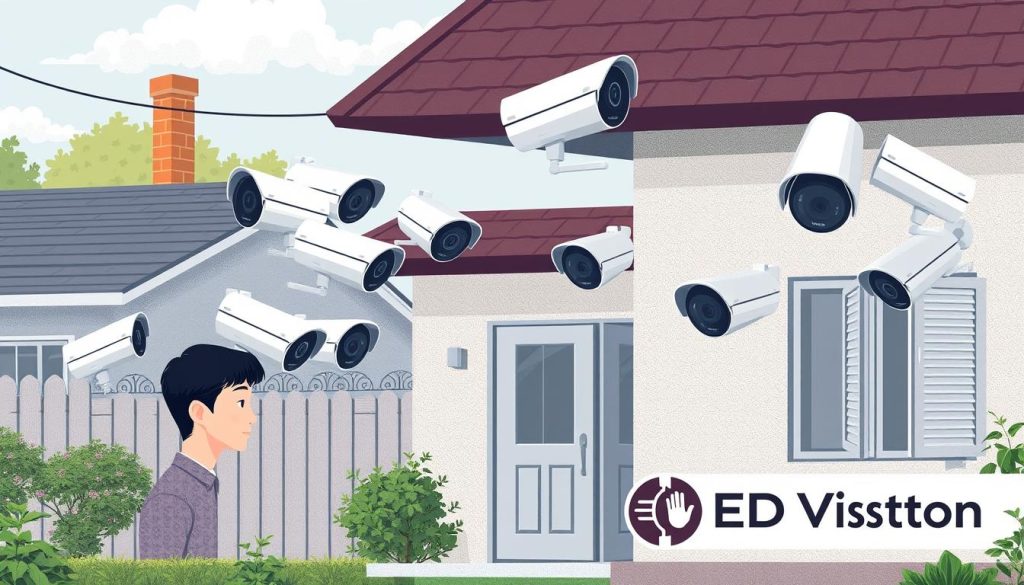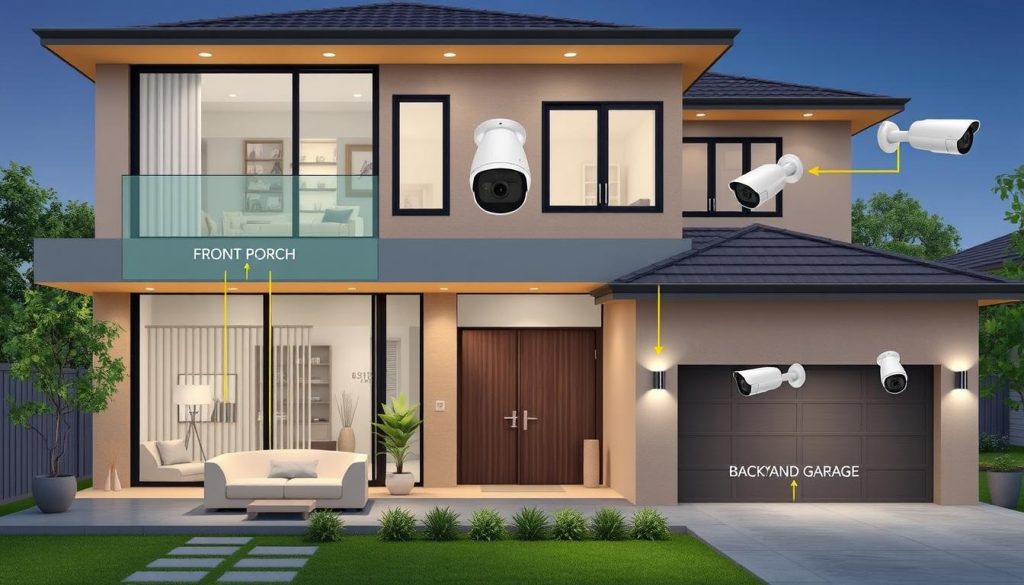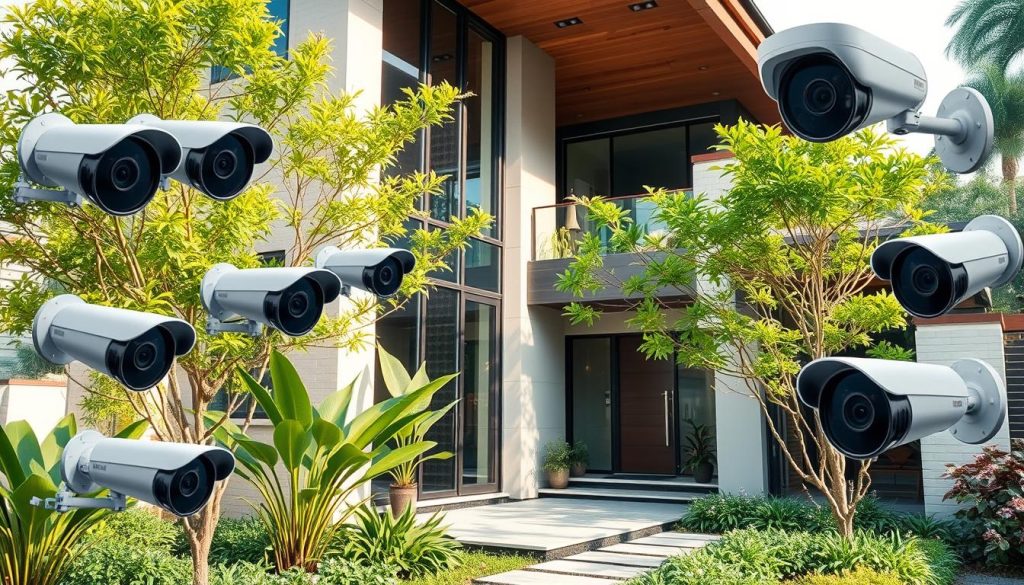Have you ever wondered if you have enough security cameras to keep your home safe? Choosing the right CCTV cameras is more than just placing them everywhere. It’s about finding the perfect system for your home. A good security system keeps intruders away and gives you peace of mind. It lets you watch over your home like never before.
Home invasions are becoming more common, making good surveillance even more important. In this article, we’ll look at different CCTV cameras and how to pick the best ones for your home. We’ll also talk about how many cameras you need for good coverage. Knowing these things can make your home security better and protect you from threats.
Key Takeaways
- Most homes benefit from installing between 2 and 6 security cameras.
- Key areas to monitor include entrance points like doors, garages, and yards.
- Effective surveillance combines various camera types for complete coverage.
- Consider using both wired and wireless cameras for a flexible system.
- Contact ED Viston at +65 8313 4578 for the latest CCTV solutions and offers.
Importance of Home Security Cameras
Home security is more important than ever. Home security cameras are key to keeping homes safe. They let homeowners watch over their homes, giving them peace of mind.
They help prevent break-ins and capture evidence if needed. This is why surveillance is so important.
The Need for Surveillance
Crime rates change, but surveillance is always needed. Adding security cameras makes homes safer. A camera can scare off burglars, lowering the risk of a break-in.
Footage is key for police and insurance claims. It also lets homeowners keep an eye on their homes from anywhere.
Statistics on Home Invasions
Home invasion stats show why security is critical. Homes without cameras are three times more likely to be broken into. This shows how vital cameras are in keeping homes safe.
Experts say having cameras at every entry and hidden spots makes homes less attractive to burglars. This helps protect homes and loved ones.
Security systems are a big deal. Theft or vandalism can cost a lot. Investing in good surveillance is a smart move to protect what matters most.
To find out more about CCTV solutions and deals, call ED Viston at +65 8313 4578.
Types of CCTV Cameras Available
Understanding the different CCTV cameras is key to better home security. Each type has its own use, whether for indoor or outdoor surveillance. Choosing the right one helps keep your home safe.
Indoor vs. Outdoor Cameras
Indoor cameras are great for watching over living areas and hallways. They are small and easy to hide, making them perfect for discreet monitoring. Outdoor cameras, on the other hand, are built to handle the weather. They’re ideal for keeping an eye on your yard and entrance.
Wired vs. Wireless Systems
Wired systems give you clear, secure footage. They’re less likely to be hacked and offer high-quality images, even at night. Wireless systems, while easy to set up, might face security risks if not managed well.
| Type of Camera | Best Use | Advantages |
|---|---|---|
| Indoor Cameras | Monitoring living spaces | Compact design, discreet installation |
| Outdoor Cameras | Perimeter security | Weather resistance, durable materials |
| Wired Systems | High-security areas | Reliable connection, high image quality |
| Wireless Systems | Flexible installation needs | Easy setup, no extensive cabling |
For custom solutions and the latest CCTV options, reach out to ED Viston today. Call +65 8313 4578 for more details on what we offer.
Choosing the Right CCTV Camera for Your Needs
When picking a CCTV camera, knowing the key specs is key. Many factors matter, and choosing wisely boosts your property’s security a lot. This part looks at important things like video quality, view area, and night vision. These all help make surveillance better.
Video Resolution Importance
Video resolution greatly affects the quality of CCTV footage. You can get from 720p to 4K, with higher being clearer for spotting details. For the best security, aim for at least 1080p. This ensures sharp images that help you see what’s happening clearly.
Field of View and Coverage
The field of view is also very important. A wider view lets you watch bigger areas, needing fewer cameras. Fixed mounts work well for set spots, while moving mounts are better for wider areas like parking lots.
Night Vision Features
Night vision is key for watching in the dark. It’s vital for homes and businesses to see clearly at night. Weatherproof cameras with night vision are best, as they work well in all conditions.
Think about what you need, like watching from afar or linking with other devices. Features like apps for smartphones make things easier and more accessible.
For custom home security, call ED Viston at +65 8313 4578. Learn about the latest CCTV tech and deals.
How Many CCTV Cameras Can I Have on My House?
Choosing the right number of CCTV cameras is key for home security. Property layout, surveillance needs, and budget are important. Knowing these factors helps pick the best camera number for your home.
Factors Affecting Camera Quantity
Several factors influence how many CCTV cameras you need. Think about these:
- Layout of the Property: Complex designs might need more cameras for full coverage.
- Targeted Monitoring Areas: Focus on key spots like entrances, backyards, and busy areas.
- Desired Detail Level: More cameras or better quality ones might be needed for clear footage.
- Budget Allocation: Plan your spending on cameras and connecting gear.
- Multitasking Capabilities: Choose cameras that can watch over several areas at once.
Recommended Number Based on Property Size
Here’s a general guide for camera numbers based on property size:
| Property Type | Recommended Camera Number |
|---|---|
| HDB or Condo | 3-4 Cameras |
| Landed House | 6-7 Cameras |
| Business Properties | 16-64 Cameras |
For HDB or condo owners in Singapore, a common setup includes a camera in the living room, kitchen, and facing the rooms. Landed houses usually need cameras at the gate, living room, kitchen, and each floor. Plus, an extra one in the backyard. These suggestions ensure you cover all areas based on your property’s size.
To find the right CCTV solutions, call ED Viston today at +65 8313 4578. They offer the latest deals and advice.
Best CCTV Cameras for Residential Use
Choosing the right CCTV cameras for your home in 2024 is important. You need to think about features, price, and how easy they are to install. Our top picks are based on over 5,000 hours of research and testing more than 100 cameras. We made sure they meet high standards for security and ease of use.
Top Picks for 2024
Here are some top choices for homeowners this year:
- SimpliCam by SimpliSafe: It scores 8.2/10 for security and is loved for its sleek design and app controls.
- Lorex: It’s easy to use, with a score of 9.6/10. It offers high-quality 4K video and is built to last.
- Ring: With a score of 9.5/10, it’s great for DIY installation and works well with Alexa.
Price Ranges and Features
Knowing the price range of cameras is key when setting up your security. Most good cameras cost between $100 and $500. Here’s a look at our top picks, including their prices and features:
| Camera | Price Range | Video Resolution | Field of View | Special Features |
|---|---|---|---|---|
| SimpliCam | $99 – $199 | 1080p | 130 degrees | Mobile app control, DIY installation |
| Lorex | $199 – $399 | Up to 4K | 130 degrees | Custom recording options, commercial-grade construction |
| Ring | $99 – $299 | 1080p (with 2K options) | 130 degrees | Alexa integration, continuous recording, easy installation |
Choosing the right camera can make your home safer and give you peace of mind. If you want to learn more about CCTV solutions and deals, call ED Viston at +65 8313 4578.
Understanding Surveillance Camera Regulations for Residential Properties
Homeowners in Singapore face a complex set of rules for using surveillance cameras. These rules help ensure cameras are used legally and safely. Knowing these guidelines is key to avoiding legal trouble.
Legal Guidelines in Singapore
Starting May 2023, HDB flat owners can install CCTV cameras without approval for corridor-facing ones. This change balances security with respect for privacy. But, cameras that look into other flats’ doors or windows are a no-go.
For cameras outside the flat, facing common areas, approval is needed. Local groups might ask for a small fee to access footage. They make sure personal info is protected.
Privacy Concerns and Compliance
Following privacy laws is vital for homeowners. Installing cameras in places where helpers might be undressed is illegal. In offices, CCTV must follow the Personal Data Protection Act (PDPA) to keep data safe.
Breaking privacy laws can lead to big fines or even jail time. It’s important to follow town council rules for camera placement in HDB flats. Neighbors might complain if they feel watched too much.
When installing cameras outside, you’ll need documents like site plans and consent from neighbors. For more on CCTV technology, check out Wenhong CCTV services.

People have the right to see their personal data from CCTV systems. About 80% of residents want CCTV for more safety. This shows how important following the rules is.
For more info on cameras and following the rules, call ED Viston at +65 8313 4578.
Video Monitoring Devices for House Security
Choosing the right video monitoring devices is key to home security. It’s important to know about storage options for recorded footage. Local and cloud storage each have their own benefits that impact your security plan.
Local vs. Cloud Storage Options
Local storage uses devices like microSD cards to save footage directly. This method gives you quick access to recordings without monthly fees. MicroSD cards offer:
- Cost-effectiveness: No ongoing costs after purchase.
- Reliability: No need for internet to access footage.
- Ease of access: Easy to view and transfer files.
Cloud storage, on the other hand, lets you access your devices from anywhere with internet. It provides:
- Automatic backups: Footage is saved in the cloud, reducing loss risk.
- Convenience: Manage and review footage from anywhere.
- Long-term storage solutions: Options for keeping footage for a long time.
Advantages of Using MicroSD Cards
MicroSD cards bring unique benefits to your home security system. They allow for continuous recording, great for busy areas. Unlike cloud storage, local storage doesn’t have monthly fees. It also offers faster access to your footage.
For a security solution that fits your needs, call ED Viston today at +65 8313 4578. Learn about the latest CCTV solutions and offers.
Best CCTV Camera Placement for Home
Placing CCTV cameras right is key for good surveillance and security. Knowing where to put them helps a lot. It can scare off intruders and keep your home safe.
Key Areas to Monitor
Focus on spots where burglars often enter. Here are important places to watch:
- Doors and windows: Most burglaries start here, so cameras here are very important.
- Staircases and hallways: Thieves often use these paths, so keeping an eye on them is smart.
- Yards: Many burglars hide in yards, so cameras here are essential.
- Valuable items: Cameras near things like electronics or cash are very useful.
- Storage areas: Keep an eye on places where small, valuable things are kept.
Hiding Cameras for Enhanced Security
There’s a debate on hidden vs. visible cameras. Each has its own benefits. The right choice depends on your needs.
- Cameras should be out of reach to avoid tampering.
- Outdoor cameras need to be weather-proof.
- Cameras should be placed to avoid glare and use HDR for better video.
- Cameras 8 to 10 feet up cover more area and reduce blind spots.
- Visible cameras can scare off would-be thieves.

For the latest CCTV solutions and offers, contact ED Viston today at +65 8313 4578.
Installation Options for Your CCTV System
Choosing the right installation method for your CCTV system is key to its success. Knowing the difference between DIY and professional installation helps you pick the best option for you.
DIY vs. Professional Installation
DIY installation is popular because it’s cheaper and flexible. If you know a bit about tech, you can set up a basic CCTV system yourself. Digital systems, with their simple setup and little wiring, are great for DIY.
Online guides make the process even easier. But, if you want a top-notch setup, go for professional installation. Experts can place cameras just right and follow all rules and laws. They also avoid common mistakes that DIY might lead to.
Guidelines for Proper Setup
Whether you install it yourself or hire a pro, following some key steps is vital:
- Put cameras in important spots like doors, lobbies, and parking areas.
- Position cameras to see as much as possible, but avoid sunlight to cut down glare.
- Mount cameras high and secure to stop tampering.
- Keep power sources close to cameras for steady performance.
- Keep your system clean and check it often to keep it working well.
For help and the latest in CCTV tech, call ED Viston at +65 8313 4578. They’ll tailor solutions just for you.
Security Camera Quantity Guidelines
Finding the right number of security cameras for your home is important. It involves looking at several factors. By following these guidelines, you can meet your needs while keeping costs in check.
Establishing Your Needs
First, think about your home’s layout and where you need cameras. In Singapore, homes usually need 2 to 6 cameras for good coverage. Consider what areas you want to watch, like doors, backyards, and shared spaces.
Balancing Coverage with Cost
The number of cameras also depends on your budget. Costs include buying cameras and getting them installed. Some cameras can do more than one thing, which can save you money.
Plan your budget well. Investing in a good recorder at first can help you add more cameras later without spending too much.
For help and to see the latest CCTV options, call ED Viston today at +65 8313 4578.
Conclusion
Choosing the right CCTV cameras is key for a good home security setup. We’ve looked at how to pick the best cameras, like knowing what you need and the types available. It’s also important to think about features like video quality and how wide the camera can see.
For homes, usually 2 to 6 cameras are enough to cover everything well. This number helps you keep costs down while making sure your place is secure. It’s all about finding the right balance for your needs.
If you want to make your home security even better, contact ED Viston at +65 8313 4578. They know all about the latest CCTV tech and can help you find the best options. This way, you can feel safe and secure in your home.
FAQ
How many CCTV cameras can I have on my house?
What are the best CCTV cameras for residential use?
What types of CCTV cameras are available?
What specifications should I consider when choosing CCTV cameras?
Are there legal regulations regarding the installation of surveillance cameras at home?
What storage options are available for video monitoring devices?
What are the best practices for camera placement in home security?
Can I install my CCTV system myself?
How can I balance the number of cameras I need with my budget?
Source Links
- https://blog.arlo.com/best-security-setups/how-many-security-cameras-do-i-need/
- https://casasecurity.com.au/how-many-security-cameras-should-you-have-in-your-home/
- https://allroundsecurity.co.nz/blog/how-many-cctv-cameras-do-i-need-for-my-home/
- https://www.smssecurity.com.au/blog/how-many-cameras-do-i-need/
- https://www.smartsecurity.com.au/how-many-cctv-cameras-do-you-need-for-your-home/
- https://www.caughtoncamera.net/news/different-types-of-cctv/
- https://www.cctvsg.net/common-types-of-cctv/
- https://www.firstsolution.com.sg/what-are-the-different-types-of-cctv-cameras/
- https://kirincctv.com/choosing-the-right-cctv-camera-installation-system/
- https://www.smartsecures.com/blog/how-to-choose-the-best-residential-and-commercial-cctv-cameras
- https://www.safewise.com/home-security-faq/how-many-security-cameras-do-i-need/
- https://nellyssecurity.com/blogs/articles/how-many-security-cameras-do-i-need-a-step-by-step-guide?srsltid=AfmBOop8wr4GeuMxHTOW2YJPK9r-Sty5ERMryMM-Ear-JOFsg3bIRsSK
- https://www.cctvsg.net/how-many-cctv-should-i-install-hdb/
- https://www.security.org/security-cameras/best/
- https://www.cnet.com/home/security/best-home-security-camera/
- https://entrycare.com/cctv-law-singapore/
- https://web.securitysystem.com.sg/cctv-camera-for-hdb-flat/
- https://ipvm.com/discussions/how-many-cameras-can-one-monitor
- https://nellyssecurity.com/blogs/articles/how-many-security-cameras-do-i-need-a-step-by-step-guide?srsltid=AfmBOool6Ey-7CjbYiK8y-67feHhSijRmF0ErWOKUcI059FEV4sy0Gv-
- https://www.security.org/security-cameras/legality/
- https://www.security.org/security-cameras/placement-guide/
- https://www.cnet.com/home/security/best-places-to-install-security-cams-for-homeowners/
- https://www.osos.com.sg/2022/05/25/cctv-camera-placement-tips-for-the-best-field-of-view/
- https://www.osos.com.sg/2021/03/01/guide-to-choosing-and-using-cctv-cameras-in-singapore/
- https://www.smartsecures.com/blog/cctv-surveillance-camera-installation-how-to-secure-your-space-with-expert-tips-and-best-practices
- https://www.astrolsecurity.net/product-category/cctv/
- https://web.securitysystem.com.sg/cctv-law-singapore/
- https://nellyssecurity.com/blogs/articles/how-many-security-cameras-do-i-need-a-step-by-step-guide?srsltid=AfmBOoq-mYGqWtSYZ7igP2kXfgnKsVxSFdktzqH9B8-Wy6AeWZJxxOR9
- https://nellyssecurity.com/blogs/articles/how-many-security-cameras-do-i-need-a-step-by-step-guide?srsltid=AfmBOoo8iQTj4OZDdcBcgYDq9Ww5GgD_rfGeTkm_GFRdhNe5BeDybSB9
- https://www.justicesecurity.co.uk/blogs-item/how-many-security-cameras-do-i-need

